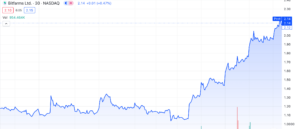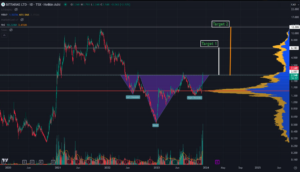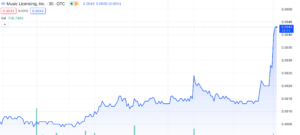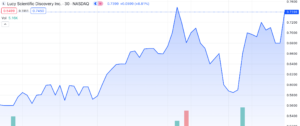Emerging Markets
Luokung Technolgy Corp and FingerMotion 2 Big Data Plays Immune from Didi Global’s (NASDAQ: DIDI) Chinese Contagion
Published
3 years agoon
By
Tom Rieder
Government crackdowns in China have had a big negative spillover effect on many Chinese stocks. DiDi Global (NASDAQ: DIDI) has been acting as a proxy for the rest of the Chinese stocks. Chinese stocks listed in the U.S. are getting pummeled on security and data-privacy concerns. Big Data and Chinese stock went into a tailspin after the Cyberspace Administration of China took down Didi’s main app on Independence Day “pending a cybersecurity review.” The timing of the takedown was one week after its IPO debut and just happened to be on July 4th. It doesn’t take a detective to figure out politics was in play. The focus of this article is on 2 Chinese Big Data stocks that are immune from this regulatory risk and were brought down without any thought to the fundamentals. The key test of Chinese data immunity lies in who owns the data versus who processes the data. Eventually stocks will decouple and the ones with the strongest fundamentals will rise again.
Luokung Technology – Leader in Mapping Technology
Luokung Technology (LKCO) is known for its “spatial-temporal big data ” which is really the study of objects or in this case vehicles moving around the city. Their data is primarily used by ride hailing services. This means they need to account for vehicle movements, traffic around the vehicle, obstacles, and the movement of people during the planned pickup. The company has also developed a smart city concept that ties traffic, emergency services, delivery, mass transit, and even road repairs into one map that seeks to optimize the movement within the city factoring different priorities like emergency services when they are needed. A future facet of their business is autonomous driving which will have to factor in not only other vehicles, but pedestrian movements. If all vehicles have a common interface and are interconnected there can be a general awareness between vehicles allowing everyone to stay safe. The most difficult part of determining a universal map that consists of cars and pedestrians is connecting to the Internet of Things (IoT) to assist in confirming and predicting pedestrian movement. The universal driver behind each of their business segments is big data.
Investor Presentation – BigData Hub Concept
Many data feeds from their digital partners who own and store the data feed into a centralized server where they are dissected, interpreted, and prioritized. From these data feeds they are able to render a multilayer dimensional map (see below). From this map they are able to generate predictive algorithms capable of figuring the optimal route factoring in traffic.
In essence the company provides DaaS (Data as a Service), SaaS (Software as a Service), PaaS (Platform as a Service), and combinations in between. Saleya Holdings (eMapgo) which was purchased for $120 million on August 28, 2019 has 3 main revenue stream classifications. They have map data services, autonomous driving map data services, and in-dash navigation.
The revenues of the subsidiary are modest at the moment, but represent an enormous emerging market and almost a pure play on the autonomous driving market segment.
The mobile application known as Luokung is primarily a Business to Customer (B2C) situation that utilizes railroad-WiFi in concert with its software apps to provide tailored content that contains relevant information, entertainment, travel, and e-commerce to the long distance rail rider. The guiding principle behind the service that has over 51 million users is to reduce boredom on the trains and push the idea of discovering new things to do upon arrival. Advertising is a key component of their model that includes online to offline (O2O) which hopes to engage passengers while enroute, to purchase or do something once they arrive at their destination. Recommendations are based on users interests which include restaurants, entertainment, accommodations, local snacks, local products, scenic spots, or points of historical significance.
The Grecent deal with Tencent Holdings (OTCMKTS: TECHY) initially expanded the base of passengers and increased revenue per customer because high-speed rail customers typically spend more. This eventually morphed into Luokung Location-based Services (LBS) Data Marketing Platform that is a combination of advertising and very detailed maps, points of interest, 20,000 commercial buildings, train stations, shopping malls, and airports.
They also have Business to Business (B2B) and Business to Government (B2G) services. These programs operate in real time allowing the business customers like ride hailing services to predict pickup and drop off points and arrival and departure times with greater accuracy. Smart cities seek to control the port of entry, traffic monitoring, and logistical movement using proprietary systems covered by patents and copyrights that allow for the transmission and rendering of extremely detailed maps that are graphically optimized to operated in a low bandwidth infrastructure while bringing the equivalency of terabytes of data.
Financial Performance
The company has high R&D expenses and high marketing expenses because they operate in a state of continuous improvement in order to keep customers satisfied and retained on their platforms. The focus of their efforts are on additional features and performance enhancements while at the same time expanding markets and acquiring business or technology that fits. Notes 4&5 in the cost of revenues was primarily intercompany receivables and amortization of intangible assets which serve to only weaken the earnings outlook only in the short run. .
LKCO currently has a market capitalization of $515 million and has 318 million shares outstanding. The company made 3 offerings in 2021 and brought in about $120 million in cash. They also completed the acquisition of Saleya on March 17, 2021 for $102 million in cash. They also have strong backing from Geely, a large Chinese car manufacturer and other notable entities and wide industry connections not to mention their cooperation deals with Beidou positioning, Dell, and National Goepspatial.
Busy Start / Future Catalysts
March: LKCO announced the acquisition of 100% equity interest in EMG, the first-class mapping company. Following the Company’s successful financing of US$120 million, LKCO has completed the acquisition, which has become a wholly owned subsidiary of the Company.
April: The company received a notification letter from Nasdaq stating that it has regained compliance with the requirement rule of minimum bid price in 5550(a)(2).
May: LKCO obtained the contract which is about the new traffic control system and Intelligent Road.
July: It announced a formal strategic cooperation agreement with the National Geospatial Information Center (NGIC) in a range of sectors including geospatial information services. Besides, recently LKCO revealed that it will cooperate with one of the top China’s automakers collecting and managing the data of autonomous driving vehicles.
The stage is set for more acquisitions around the core mapping technology. They are also winning more contracts in government and with car manufacturers which will boost the financial outlook and perhaps generate the cash they need for more acquisitions. Processed data is what they sell and it’s quite valuable but the raw data is not something they own. This is why they are immune to government crackdowns. The drop in stock price was completely unrelated to government regulation and people will eventually understand that these autonomous cars will need virtual drivers and when they do only a few players in the world like LKCO will be able to take the wheel.
FingerMotion – Leading InsureTech Player
FNGR has 3 primary business silos. They have a mobile data and recharge platform, an SMS and MMS payment solutions, and their big data solutions wrapped up in their subsidiary called Sapientus. These silos are all interconnected because FNGR has direct access to the mobile carriers. This gives them an unprecedented number of users that can be converted into buying goods and services that FingerMotion is reselling. This availability of user metadata helps them create extremely accurate algorithms that can better predict user behavior in its Big Data arm.
Top Up & Mobile Recharge
The company started in the Top up and mobile recharge business. In the United States most cell phones are on monthly plans that are paid after usage, but in China the phones add minutes or data in incremental amounts. FingerMotion has the wholesale license to sell Top up minutes from China Mobile and China Unicom which are the largest telecoms in China, to e-commerce platforms that include AliBaba (NASDAQ: BABA), PingDuoDuo (NASDAQ: PDD), and JD.com (NYSE: JD). These e-commerce platforms have well over a billion users and allow FNGR to market Top up minutes to their respective user bases. FNGR gets a small sliver of millions of transactions daily. Their margins are quite thin, but they have no marketing expenses and don’t have to spend money to retain customers like the e-commerce platforms do.
SMS & MMS
The SMS and MMS business are responsible for most of the gross profit and has been one of the fastest growing business silos in the company.
Big Data
The Big Data business is held in the subsidiary Sapientus. It is run by a team of seasoned actuaries and data scientists with a specialty in creating algorithms. The life blood of the insurance industry comes down to risk analysis. The developing insuretec business at Sapientus is driving innovation in the insurance business that enables the real time assessment of an individual based on risk scoring. They currently have big data agreements with Pacific Life Re and Happy Life Insurance with many more on the way.
The algorithms developed by their big data research team take many personal factors into account. However, the data that goes into these algorithms is from non-identifiable people whose information resides on the host server where the data was sourced from. Think of it as taking a personal profile and instantly type casting them so that they fit into many different molds like a fitness fanatic or a video gamer.
Their personal identity is lost but their behaviors and what they typically do are turned into an algorithm that uses distributional statistics and cluster variables that would mimic their actual behavior. Insurance risk algorithms would assign risk scores to these behavioral profiles so when queried in real time, that particular individual would be matched against a behavioral profile that was already assigned a risk score and can be immediately quoted.
The behavioral analytics also have far reaching consequences inside and outside the insurance business. For example, another application within the field of insurance is fraud detection to ensure the claims match up to the risk profile. Outside the insurance sector, big data can profile people seeking credit or financial services which represent a huge untapped market due to the unavailability of credit scores in China. Morphing into the largest credit scoring reporter in China means FNGR could eventually challenge Visa (NYSE: V) or MasterCard (NYSE: MA), American Express (NYSE: AXP) or PayPal (NASDAQ: PYPL) and become a ripe acquisition target for one of these behemoths.
In fact FNGR should be able to do anything big data provider Snowflake (NASDAQ: SNOW) can do because SNOW is focused behavior around product sales of merchandise while FNGR is more focused on the consumer who is infinitely more complicated. FNGR uses practically the same structure as SNOW just liess the centralized storage of data. If SNOW was looking toward international expansion FNGR would be on the short list. When considering the $78 billion market cap of SNOW versus the $120 million FNGR, FNGR might not last even a year on the NASDAQ before they get gobbled up for their unparalleled access to all of China.
Heavily Shorting the Macro Without Paying Attention to Core Fundamentals
Both stocks FingerMotion and Luokung Technology have active shorts. The shorts expect continued sector weakness and they have literally done no due diligence on these names. LKCO has had its short interest rise from 69K to 8.7 million shares in just the past 6 months. Average daily volume has exploded to 16.5 million. The short volume is much harder to see in FNGR because it’s traded in the OTC market. There are 4.2 million shares held at DTC and only 750,000 shares are held by retail as evidenced by the average volume of 20,000 shares traded daily. That’s only 3% turnover of the real float daily. The smoking gun signature of the short presence in FNGR are large orders that have been pummeling the bid in quick succession.
Investment Summary
The market is playing the guilt by association game when it comes to Chinese big data plays. Any Chinese company that collects, stores, or owns personal data seems to be a target. Since Chinese companies are not really that well covered or known for their transparency, shorts are pounding on names hoping to play on investors fears that they don’t understand the fundamentals of the business. This has created an enormous opportunity in a couple of e-commerce and big data plays growing extremely quickly and quietly in China. Most notably are LKCO and FNGR. Both of these companies are provided with Big Data and then analyze and manipulate into something that is actionable by the user. They DON’T OWN THE DATA so they are immune from government intervention.
Whether it’s finding out where your pickup location is scheduled or an optimized quote on car insurance, Big Data is transforming the lives of the Chinese people. The Chinese market is enormous so creating disruptive technologies like autonomous drivers or insuretech solutions will catch on and scale very rapidly. LKCO has invested a tremendous amount into R&D and is on the cusp of monetizing their disruptive solutions to the market. FNGR is on the verge of rolling out insurtech products that could ultimately transform the Chinese insurance industry and its unthinkable that this name is only worth $120 million when it could completely dominate the insurance market in the coming 2 years. They are also moving forward with a NASDAQ uplisting that could provide institutional interest that has been lacking while squeezing to shorts to cover their naked positions ahead of the uplisting.
Disclosure: we hold no position in LKCO or FNGR either long or short and we have not been compensated for this article.
You may like
Emerging Markets
Bitfarms (NASDAQ: BITF) in Focus: Exploring the Meteoric 110% Surge and Macro Influences
Published
8 months agoon
December 7, 2023
Bitfarms Ltd. (NASDAQ: BITF) rides the wave of explosive growth surging by over 110% from its lows of $1.03 per share in November. This BTC miner has witnessed a 41% increase since last Friday, December 1st, 2023. If you’ve been keeping up with our recent articles, you’ll notice that majority of coverage lacks substantial press releases or filings supporting a surge in valuation. Today’s coverage includes precisely that and more. Let’s delve deeper into BITF to assess if this crypto miner is worth considering amidst the ongoing rise in spot BTC.
 Background:
Background:
Established in 2017, BITF has established itself as a global leader in Bitcoin (BTC) mining. Utilizing its computational power, the company contributes to various mining pools, earning payment in Bitcoin.
BITF sets itself apart by developing, owning, and operating vertically integrated mining farms. These facilities feature in-house management, company-owned electrical engineering services, installation support, and multiple on-site technical repair centers, ensuring a comprehensive operational setup. Bitfarms relies on its proprietary data analytics system, ensuring superior operational performance and uninterrupted service.
Currently managing 11 farms across four countries—Canada, the United States, Paraguay, and Argentina—Bitfarms predominantly uses environmentally friendly hydro-electric power and maintains long-term power contracts. The company remains dedicated to employing sustainable energy sources, often utilizing locally available and under-utilized energy infrastructure.
In its recent upgrade initiative, BITF has improved its fleet’s efficiency and capital practices ahead of the Halving. This strategic move aims to boost its capital-efficient fleet to 12.0 EH/s by Q2 2024. The focus lies in reducing miner and energy costs, enhancing fleet energy efficiency, and fostering greater pricing flexibility for sustained growth and success.
Subscribe to Microcapdaily.com Right Now by entering your Email in the box below.
Subscribe to Our 100% Free Penny Stock Newsletter. We Have Something Big Coming!
Market Update:
At the core of BITF’s latest momentum and strength lies its connection to macro-scale factors. To provide deeper insights into BITF’s future prospects, we’ve conducted a comprehensive market analysis.
The latest market surge propelled spot BTC above the USD $44,000 mark at its peak, reaching its highest value in more than 19 months. This remarkable rally emphasizes the enduring positivity shared among retail and institutional traders alike.
Blackrock ETF:
The primary driving force behind Bitcoin’s ascent appears to be rooted in market expectations of an approved spot BTC exchange-traded fund (ETF) in January 2024. This anticipation has spurred substantial cash inflows from institutional investors, contributing significantly to Bitcoin’s current trajectory.
If the approval unfolds as anticipated, it has the potential to bring a substantial wave of fresh capital into Bitcoin. According to certain projections, this approval might introduce up to $50 billion in new liquidity to Bitcoin. The precise impact on Bitcoin’s price remains uncertain; however, a particular model suggests a 4% price surge for every $1 billion that enters Bitcoin. Consequently, if the projected $50 billion materializes, Bitcoin could potentially double or even triple in value.
Rumours from Qatar:
As per bitcoin enthusiast Max Keiser, Qatar’s sovereign wealth fund (QSWF) (mainly tasked with managing the nation’s extensive oil and gas-derived wealth), is contemplating a significant investment spree of up to $500 billion in the flagship cryptocurrency, Bitcoin.
To offer a comparison, this proposed investment dwarfs the disclosed Bitcoin holdings of MicroStrategy, founded by Michael Saylor, by an astonishing 671 times. Presently, MicroStrategy stands as the largest corporate holder of Bitcoin, possessing 174,530 BTC following its acquisition in November.
Keiser is notably optimistic that QSWF’s monumental investment could propel the price of bitcoin to reach soaring highs of $100,000.
Binance Update:
In the aftermath of former Binance CEO Changpeng Zhao’s guilty plea and the subsequent $4.3 billion settlement with the U.S. Department of Justice (DOJ) on Nov. 21, Bitcoin’s price initially showed mixed signals. Contrary to expectations, Binance did not experience a mass exodus of funds similar to what FTX faced during its public liquidity crisis. Notably, prominent figures in the crypto space, such as Galaxy Digital CEO Mike Novogratz, perceive the settlement as a positive development overall.
At first, Binance’s Bitcoin reserves dropped by 17% from their peak. Following the initial outflows, the balance has shown an increase of nearly 1%. As for FTX, their BTC reserves fell a staggering 99.9% from all-time highs in November 2022 ,with no recovery in sight.
This serves as a significant testament to Bitcoin’s resilience at present, even as the largest cryptocurrency exchange by volume faces a monumental lawsuit. Unlike the substantial impact experienced by FTX, this legal challenge did not severely affect BTC reserves.
So What?:
With multiple factors driving spot BTC, smaller-scale BTC miners are becoming increasingly attractive -especially considering the potential financial growth and rising profit margins. Let’s delve into the recent developments concerning BITF for a closer look.
Subscribe to Microcapdaily.com Right Now by entering your Email in the box below.
Subscribe to Our 100% Free Penny Stock Newsletter. We Have Something Big Coming!
What Happened:
On December 1st, 2023, BITF released a comprehensive performance and financial update, revealing robust figures for their BTC mining operations. Based on this report alone, it’s evident that BITF boasts a substantial global operational capacity and possesses the financial support needed to remain competitive, particularly as BTC mining grows more challenging post-halving. To enhance clarity, we’ve restructured the release into bullet points for easier comprehension.
BTC Production: November production recorded 392 BTC, a 1.5% decline from October. The network difficulty surged by 19.0% in November, indicating strong miner demand leading into the 2024 Halving.
Network Metrics: For the eleven months ended November 30th, network difficulty increased by 92.2%, while BTC’s price rose approximately 128.4%. This resulted in a 33.9% improvement in production economics measured by USD/TH/day.
Operating Highlights:
- 6.4 EH/s was online by November 30, 2023, marking a 45% increase from November 30, 2022.
- 66.4 BTC/average EH/s was recorded, down 1.9% from October 2023.
- 13.1 BTC earned daily on average in November, equivalent to about $495,200 per day based on a BTC price of $37,800 on November 30, 2023.
Expansion Initiatives:
- Firm purchase order placed for 35,888 Bitmain T21 miners, with an option for an additional 28,000 T21 miners.
- Finalizing contracts to expand operating capacity from 30 MW to 50 MW at Paso Pe, adding 20 MW of hydro-miner containers.
Financial Update:
- Raised $44 million in gross proceeds through a private placement of common stock and warrants.
- Sold 350 BTC, generating $12.8 million in total proceeds.
- Added 42 BTC to treasury, holding a total of 802 BTC, valued at approximately $30.3 million based on a BTC price of $37,800 at November 30, 2023.
- Held Synthetic HODL™ of 35 long-dated BTC call options as of November 30, 2023.
- Reduced outstanding indebtedness by $1.9 million, leaving a remaining balance of $6.0 million at November 30, 2023.
Technical Analysis:
We’re noticing a trend among retail traders on social platforms like X, discussing technical trading patterns related to crypto miners, specifically highlighting positive momentum linked to an Inverse Head and Shoulders (IHS) pattern. A user, @FreeDoomCapital, suggests that among all miners, BITF seems to exhibit the clearest pattern. Here’s a brief explanation of the pattern to enhance your comprehension.
The Inverse Head and Shoulders (IHS) pattern is a technical analysis formation commonly observed in financial markets, particularly in stocks, currencies, and cryptocurrencies. It’s considered a bullish reversal pattern and typically appears after a downtrend.
Here’s a further breakdown on the pattern:
- Formation: The pattern consists of three successive troughs. The middle trough (the “head”) is the lowest point, while the two surrounding troughs (the “shoulders”) are higher than the head and relatively symmetrical in height.
- Shoulders: The left and right shoulders are formed at the end of a downtrend. They show a decline in price followed by a temporary stabilization or slight increase before declining again.
- Head: The head is formed after the left shoulder, indicating a further decrease in price, often reaching a new low. However, the head is typically higher than the previous trough, indicating a potential shift in the downward momentum.
- Neckline: The neckline is a trendline connecting the highs of the two shoulders. It acts as a critical level; a breakout above this line is a significant signal for a potential trend reversal.
- Volume: Volume analysis can complement the pattern. Generally, during the formation of the left shoulder, the volume decreases, increases during the head formation, and decreases again during the right shoulder formation. A breakout with higher volume after the formation is considered a stronger confirmation of the pattern.
- Confirmation: A confirmed Inverse Head and Shoulders pattern occurs when the price breaks above the neckline. Traders often look for a sustained move above the neckline to confirm the reversal.
The Inverse Head and Shoulders pattern is considered complete when the price breaks above the neckline, indicating a shift from a downtrend to a potential uptrend. Traders and analysts use this pattern as a signal to anticipate higher prices, and they often set price targets based on the distance between the neckline and the head.
Similar to all technical trading patterns, it’s important to recognize that it’s not foolproof and may not be accurate in every instance. However, it’s noteworthy that several sources are paying attention, particularly due to the apparent clarity of BITF’s formation of an IHS pattern in their lineup.
Conclusion:
An essential consideration with BTC miners is the increasing difficulty of mining the digital asset after halving, which is scheduled for around April 2024. BITF’s recent fleet upgrade aims to strengthen its capacity pre-halving, positioning itself as a frontrunner. With spot BTC around USD $44,000, the 392 BTC mined in November alone would translate to approximately USD $17 million in top line revenue. If potential BTC catalysts sky rocket the price to USD $150,000 as some suggest, November’s mining performance would represent nearly $60 million – and that’s just in one month. As one of the leading BTC miners globally, we highly recommend keeping BITF on your radar.
We will update you on BITF when more details emerge, subscribe to Microcapdaily to follow along!
Subscribe to Our 100% Free Penny Stock Newsletter. We Have Something Big Coming!
Disclosure: We have not been compensated for this article/video. MicroCap Daily is not an investment advisor; this article/video does not provide investment advice. Always do your research, make your own investment decisions, or consult with your nearest financial advisor. This article/video is not a solicitation or recommendation to buy, sell, or hold securities. This article/video is our opinion, is meant for informational and educational purposes only, and does not provide investment advice. Past performance is not indicative of future performance.
Picture by WorldSpectrum from Pixabay
Emerging Markets
Music Licensing Inc. (OTC: SONG): Unraveling the 1250% Surge and Current Valuation
Published
9 months agoon
November 10, 2023
Music Licensing, Inc. (OTC: SONG) shares skyrocket a whopping 100% gain at the time of writing, marking an incredible 1250% surge since their October low of $0.0004. Many appear to be wondering the cause behind the sudden rise and after today’s spike we decided to do more research. Let’s dig into the company and its recent updates to figure out how they’ve pulled off such an impressive climb and what might be coming next.
Background:
Starting with their name – Music Licensing, Inc., it is more commonly recognized as Pro Music Rights. If you’re diving into your own research, you’ll likely want to search by, “Pro Music Rights” to find the investor information you’re looking for, you won’t find much under the stock name alone.
In a nutshell, SONG is a performance rights organization (PRO) and was the 5th to be established in the United States. If that mean’s absolutely nothing to you, skip to the next title for a better understanding.
Nethertheless, they’ve got some big players under their license umbrella, including TikTok, iHeart Media, Triller, Napster, 7Digital, and Vevo. In total, SONG holds an estimated market share of 7.4% in the United States, representing a whopping 2,500,000 works.
Look out for familiar artists like A$AP Rocky, Wiz Khalifa, and Young Jeezy in their impressive lineup. For more details on other notable artists, their press releases have a comprehensive list for you to explore.
Again if the whole idea of a Performance Rights Organization (PRO) feels confusing, you’re not alone. We did some digging to break it down for you.
What’s a Performance Rights Organization:
To keep it simple, think of a Performance Rights Organization (PRO) as the backstage manager for musicians. It’s like the middle person making sure that when your favorite songs are played in public—on the radio, at concerts, or even on your go-to streaming app—the artists get their fair share of the spotlight. These organizations, such as ASCAP, BMI, and SESAC, keep tabs on where and how music is being enjoyed and make sure the right people get paid for their tunes. It’s a behind-the-scenes gig that ensures artists get a nod and a paycheck every time their music takes center stage.
Latest Press Release:
This morning on November 10th, 2023, the company announced it will be cancelling 59.9% of their outstanding shares to enhancing Shareholder Value.
“Following the cancellation of an astounding 1,566,945,290 common stock shares, which reduced the total outstanding shares to 2,000,000,000, Mr. Noch is now embarking on yet another groundbreaking endeavor. He has pledged to cancel an additional 1,197,364,785 common stock shares, equating to a remarkable 59.9% of the current outstanding shares”.
Taking the cancellation of all these shares would also mean their market cap would be effected pretty drastically as well. If we do the math (at time of writing), 2B shares outstanding multiplied by the current stock price of $0.004 would mean ~8M market cap.
Okay Jake, so you’ve done the share reduction dance, claiming it’s a boost for shareholders. But really, what else does cutting down on shares mean for investors. Allow us to further break it down.
Subscribe to Microcapdaily.com Right Now by entering your Email in the box below.
Subscribe to Our 100% Free Penny Stock Newsletter. We Have Something Big Coming!
Why Does it Matter?
Cutting down on the number of shares a company has floating around might seem like financial gymnastics, but it actually makes sense for a few reasons:
- More Bang for Your Buck (EPS): Picture this – you and your buddies own a pizza joint. If you slice up the pizza into more pieces, each one gets smaller. The same goes for shares. Less shares mean each piece of the company’s earnings pie goes to fewer shareholders, so everyone’s slice gets bigger. That’s what we call Earnings Per Share (EPS), and a bigger slice is usually good news.
- Share Price Perk: When a company trims down its shares, it can potentially give its stock price a boost because the float is now tighter. With a tighter float, it doesn’t take as much buying to move the stock price in either direction.
- Steady Ship: Fewer shares mean fewer folks holding the reins. It’s like steering a ship – with fewer hands on deck, it’s easier to keep things steady. Reducing the number of shares available for purchase also makes it harder and more costly for others to buy a big chunk of ownership, fortifying the company against hostile takeovers.
- Improved Financial Ratios: Reducing shares outstanding can even positively impact financial ratios, such as earnings per share, return on equity, and book value per share. These improvements of course make their financial profile more attractive to investors by and large.
Financial Highlights:
Despite having a market cap of around $15 million on YahooFinance, or $8 million if we consider the share consolidation, SONG has posted impressive numbers for its financials. They’ve managed to rake in a substantial $758 million in revenues, pushing a solid net income of $39 million. Their quarter ending in June, 2023 showed 93M in revenue, which was also net profitable too. Digging into their balance sheet, you’ll find $45 million in assets and a modest $61,000 in liabilities. Given those figures, this valuation’s definitely a head-scratcher and seems completely off.
Subscribe to Microcapdaily.com Right Now by entering your Email in the box below.
Subscribe to Our 100% Free Penny Stock Newsletter. We Have Something Big Coming!
Behind SONG’s Low Valuation:
According to one user, @StockPicksNYC, on Twitter there’s a story behind why their valuation is so low given their fundamental financial backing.
Apparently the stock’s low valuation can be attributed to a previous incident where a storm-induced power outage at the CEO’s residence led the company to a downgrade on OTC markets, pushing SONG into ‘Expert Market‘ status with a ‘Shell Risk’ label.
Despite successfully addressing challenges to regain ‘Pink Current’ status and remove the ‘Shell Risk’ designation, SONG is still unable to update its information on the OTCM platform.
This is a well-documented problem with OTCM and there’s ongoing litigation with OTC Link, (an OTC Markets subsidiary), revolving around transparency and responsiveness issues during efforts to resolve downgrade-related issues.
This has now pushed SONG to take further measures to safeguard itself and its shareholders. They currently have a lawsuit filed against OTC Markets, where they’re pursuing $386.6 Million in Damages.
The good news is despite the lack of information on OTCM, SONG filed a Form 1-SA with the SEC to provide detailed information about their business.
OTC Expert Market:
If we look at the OTC Market tiers, there’s OTCQX, OTCQB, OTCPNK, OTC Expert Market, and OTC Grey. Back on September 28, 2021 the SEC put an amendment in place that stops brokers from quoting stocks without current information. That’s where OTC’s Expert Market steps in.
In a nut shell, any company that does not have current information publicly available trades on OTC Expert Market. Only broker-dealers, professionals or sophisticated investors are allowed to view quotations in Expert Market securities. It of course comes with massive risk given you’d be completely unaware of the company’s financial health.
Conclusion:
Among many factors, SONG’s impressive revenue and profits alone make the company appear considerably undervalued. Even without more developments, we can imagine a company of this caliber will inevitably draw increasing interest from investors. Considering the legal issues with OTC, a move to a bigger exchange like the NYSE or NASDAQ seems likely. They’d atleast be a great candidate considering the fundamentals. Keep in mind, this dynamic story could change at a moments notice, so be sure to keep them on your radar.
We will update you on SONG when more details emerge, subscribe to Microcapdaily to follow along!
Subscribe to Our 100% Free Penny Stock Newsletter. We Have Something Big Coming!
Disclosure: We have not been compensated for this article/video. MicroCap Daily is not an investment advisor; this article/video does not provide investment advice. Always do your research, make your own investment decisions, or consult with your nearest financial advisor. This article/video is not a solicitation or recommendation to buy, sell, or hold securities. This article/video is our opinion, is meant for informational and educational purposes only, and does not provide investment advice. Past performance is not indicative of future performance.
Picture by whoalice-moore from Pixabay
Emerging Markets
Lucy Scientific Discovery’s (NASDAQ: LSDI) Game-Changing Move: A Closer Look at the High Times Acquisition
Published
11 months agoon
September 8, 2023
On August 8th, 2023, Lucy Scientific Discovery Inc. (NASDAQ: LSDI), a leading developer in the psychedelic drug industry, witnessed an impressive surge in its stock value, gaining approximately 25% in combined trading, including after-hours (AH) trading. The British Columbia-based company made headlines by announcing its strategic move to acquire intellectual property (IP) from the renowned cannabis publication, High Times Holding Corp. (HHC).
Additional Background:
Under this agreement, Lucy will exchange 20% of its shares and a series of payments for access to HHC’s valuable IP portfolio, which includes the rights to generate licensing and royalty income from renowned brands like High Times, 420.com, and Cannabis Cup, along with their associated domain names.
The partnership between #HighTimes and #LucyScientificDiscovery just makes sense. It's a harmonious alignment that should lead to success. This could be the start of something special as they journey towards ambitious goals.$LSDI $TSLA $SPY pic.twitter.com/qgXYkKQVoe
— Luca Grayson (@GraysonLucasa) September 7, 2023
Lucy’s commitment involves making semi-annual payments to HHC over a five-year period, structured around earnings before income, taxes, depreciation, and amortization (EBITDA) generated through the acquired IP. The flexibility exists for Lucy to fulfill these payments either in cash or through stock issuance and the announcement is generating considerable interest.
Furthermore, post-acquisition, Lucy will grant High Times the opportunity to operate retail outlets and distribute THC products bearing these prestigious brands within the United States. This privilege comes in exchange for an annual license fee of $1 million, set to double to $2 million annually once federal legalization of cannabis occurs in the country.
Subscribe to Microcapdaily.com Right Now by entering your Email in the box below.
Subscribe to Our 100% Free Penny Stock Newsletter. We Have Something Big Coming!
Leveraging the brand rights secured from HHC, Lucy aims to bolster its revenue streams by expanding and enhancing its existing 18 licensing agreements, both domestically and internationally. These arrangements encompass a wide array of consumer products and merchandise, promising to further establish Lucy’s presence in the global market. The acquisition is expected to be finalized within the coming two weeks, marking a significant strategic move for Lucy Scientific Discovery Inc.
As a result of the acquisition, High Times is now a publicly-traded entity. Lucy anticipates that this agreement will contribute over $10 million in revenue to its financial results in the upcoming year, along with $5 million in EBITDA.
By purchasing #HighTimes assets, Lucy Scientific Discovery has struck gold. It has acquired a wealth of intellectual property, trademarks, and royalty prospects that will bring #LSDI $LSDI #lucyscientificdiscovery millions of dollars. pic.twitter.com/CEkqQnuFHm
— Rowan Dune (@rowandune) September 7, 2023
Adam Levin, the Executive Chairman of HHC, expressed optimism about the deal, noting, “This transaction will create exciting new growth opportunities for the High Times brand, under the leadership of Richard Nanula, a seasoned executive with extensive experience in major consumer brands and global corporations.”
Levin also emphasized High Times’ enthusiasm in becoming a significant shareholder of Lucy Scientific Discovery. Notably, Lucy completed its initial public offering and Nasdaq listing in February, offering 1,875,000 shares at $4.00 each.
Richard Nanula, CEO of the British Columbia-based company, shared his outlook on the acquisition, stating, “Lucy expects this acquisition to rapidly generate high-margin revenue within the global cannabis sector.”
In recent developments, Lucy introduced the sleep aid product “Twilight,” which includes amanita muscaria and reishi mushrooms. Additionally, the company joined forces with Wesana Health Holdings Inc. (OTCQB: WSNAF) in March to collaborate on the development of the CBD and psilocybin-based drug SANA-013, targeting conditions such as migraines, cluster headaches, and major depressive disorder.
$LSDI's Health Canada license allows approved psilocybin sales, backed by the Canadian government's significant funding $LSDI is on fire. #LucyScientificDiscovery $LSDI
— William James (@jaym_willy) September 8, 2023
High Times, founded in 1974, has a rich history, featuring works by renowned writers like Truman Capote and Hunter S. Thompson. Since 1988, its Cannabis Cup has stood as the most prestigious cannabis competition globally, with notable judges including Snoop Dogg, Joe Rogan, Tommy Chong, and other prominent figures in the cannabis industry.
While Lucy’s shares showed a nearly 16% increase to reach $0.68 on the Nasdaq exchange on Friday, it is worth noting that they have experienced a decline of over 77% over the past year.
Macro Trend:
In recent times, our articles have prominently featured cannabis-related topics, reflecting the growing popularity of stocks in this sector. LSDI’s acquisition aligns perfectly with the current climate, as the cannabis industry experiences a significant surge, coinciding with the Health and Human Services (HHS) exploring the possibility of reclassifying cannabis from Schedule I to Schedule III of the Controlled Substances Act.
Don't overreact to temporary $LSDI EPS decline. Psychedelics mega-trend makes risk/reward compelling.#Shrooms#LucyScientificDiscovery
— gianna snell (@skatette) September 8, 2023
While many countries around the world have already moved towards decriminalization and legalization, the United States has been relatively cautious in its approach. However, the consideration of such a reclassification represents a potential historic turning point. If such a change were to materialize, it would mark a substantial shift in the regulatory landscape, potentially revitalizing cannabis as an attractive investment opportunity. The industry is already showing signs of reestablishing its market presence and could once again become a noteworthy investment option.
I know this Mindful line is set to disrupt the market. Expecting a surge in stock price in the months ahead. #Lucyscientificdiscovery $LSDI pic.twitter.com/2ccR1CttA3
— Tom (@Tomi_l33) September 7, 2023
We will update you on LSDI when more details emerge, subscribe to Microcapdaily to follow along!
Subscribe to Our 100% Free Penny Stock Newsletter. We Have Something Big Coming!
Disclosure: We have not been compensated for this article/video. MicroCap Daily is not an investment advisor; this article/video does not provide investment advice. Always do your research, make your own investment decisions, or consult with your nearest financial advisor. This article/video is not a solicitation or recommendation to buy, sell, or hold securities. This article/video is our opinion, is meant for informational and educational purposes only, and does not provide investment advice. Past performance is not indicative of future performance.
Picture by herbalhemp from Pixabay
Recent Posts

Clean Vision Corp (OTC: CLNV): Overcoming the Plastic Waste Crisis

Meta Materials (NASDAQ: MMAT): More Due Diligence and Exploring Latest Developments

Integrated Cannabis Solutions’ (OTC: IGPK) 633% Surge: Exploring Catalysts, Company Overview, and Growth Potential in 2024

Sonoma Pharmaceuticals (NASDAQ: SNOA): Potential Surge to Speculations – What Lies Ahead?

1847 Holdings (NYSE: EFSH) Soars: Insights, Acquisitions, and What Lies Ahead
Trending
-

 Uncategorized2 years ago
Uncategorized2 years agoMeta Materials Inc (OTCMKTS: MMTLP) Enormous Short Position in Trouble as Next Bridge Hydrocarbons Set to Stop Trading (George Palikaras & John Brda on Corporate Action)
-

 Micro Cap Insider3 years ago
Micro Cap Insider3 years agoMedium (KOK PLAY) The Parabolic Rise of Metal Arts (OTCMKTS: MTRT)
-

 Media & Technology3 years ago
Media & Technology3 years agoHealthier Choices Management Corp. (OTCMKTS: HCMC) Powerful Comeback Brewing as PMI Patent Infringement Lawsuit Moves Forward
-
Media & Technology4 years ago
AMECA Mining RM; the Rise of Southcorp Capital, Inc. (OTCMKTS: STHC)
-

 Media & Technology3 years ago
Media & Technology3 years agoSNPW (Sun Pacific Holding Corp) Power Brewing: 50MW solar farm project in Durango Mexico MOU with Atlas Medrecycler 48,000 SF New Partnership Queensland Australia Solar Farm.
-

 BioPharma2 years ago
BioPharma2 years agoAsia Broadband (OTCMKTS: AABB) On the Move Northbound Since Sub $0.08 Dip as Crypto Innovator Elevates AABB Crypto Exchange & Enters the NFT Space
-

 Uncategorized2 years ago
Uncategorized2 years agoMeta Materials Inc (OTCMKTS: MMTLP) Short Squeeze S-1a4 Filing Signals S1 Approval Could Be Days Away (Next Bridge Hydrocarbons Spin-Off)
-

 BioPharma3 years ago
BioPharma3 years agoHumbl Inc (OTCMKTS: HMBL) Major Reversal as Powerful Advisor Rejoins the Team & Looks to Uplist to Major Exchange















